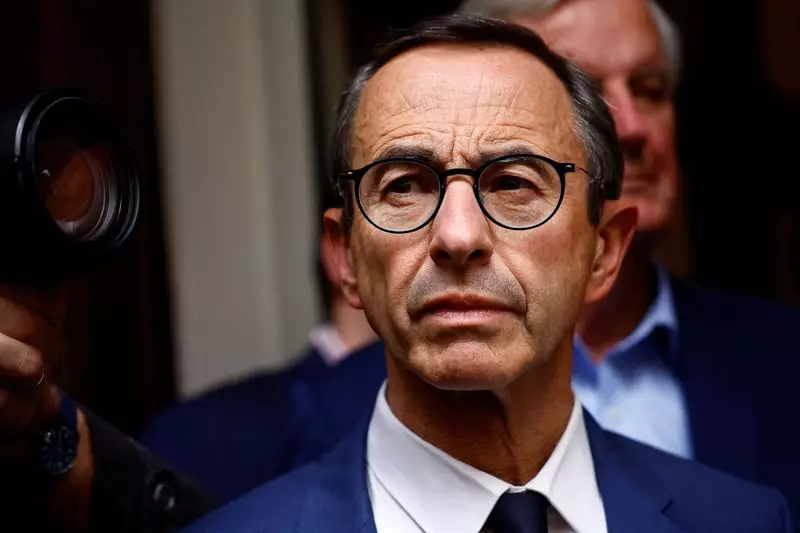The recent announcement of the new French cabinet by President Emmanuel Macron has stirred a mix of intrigue and scrutiny. Prime Minister Michel Barnier is set to lead a cabinet that reflects both continuity and change in French politics. The carefully selected ministers represent different political shades, unveiling the intricate dynamics at play within the French government. This article critically examines the main appointments and what they signal for France’s future.
Antoine Armand, the newly appointed Finance Minister, stands out as a relative newcomer in a political landscape often dominated by seasoned veterans. At just 33, Armand brings youthful energy to the prestigious Ministry of Economy and Finance, commonly referred to as “Bercy.” His ascent to this significant role follows a successful election campaign under Macron’s centrist banner, establishing him as a key player in the administration.
Armand’s background as a finance inspector bolsters his qualifications, as the ministry faces challenges such as an escalating budget deficit and impending economic reforms. However, relying solely on his status as a fresh face could be both a strength and a vulnerability. He may struggle to command authority against a backdrop of complex budgetary issues that require decisive action and experienced leadership. Furthermore, his ability to collaborate effectively with Laurent Saint-Martin on budgetary matters will be critical, especially as tensions around fiscal policy escalate.
Bruno Retailleau: The Conservative Challenger
In stark contrast, the appointment of Bruno Retailleau as Interior Minister mirrors the broader political trajectory of France toward right-leaning policies. Retailleau has long been a stalwart of the Republicans party and is known for his hard-right stance, particularly on immigration—a pivotal issue in contemporary French politics. His influence is likely to reshape the government’s approach to internal security and social policy.
Retailleau’s vocal criticism of Macron’s prior immigration reforms draws upon his deep ties within the conservative base, which may become increasingly significant as the government grapples with societal unrest and public dissent. His focus on tougher measures against protest movements and welfare reforms not only reflects his ideological stance but also illustrates the internal conflicts that may arise within the cabinet. While his leadership may energize conservative factions, it remains to be seen how this aligns with Macron’s overall strategy.
Jean-Noel Barrot: A Diplomatic Legacy
Jean-Noel Barrot’s transition from Junior Minister for European Affairs to Foreign Minister exemplifies a calculated move to retain a balance within Macron’s cabinet. Hailing from a politically active family, Barrot’s prior experience lends him insights essential for navigating foreign relations, especially during an era marked by urgent global challenges.
Barrot’s promotion signals an acknowledgment of the importance of European ties, particularly in light of ongoing geopolitical tensions. His centrist affiliation adds a layer of complexity to the cabinet dynamics, as he attempts to bridge the varied interests of coalition partners. Striking a compromise between centrist and more radical elements of the government may define his term in office and serve as an essential litmus test for Macron’s ability to maintain political stability.
Benjamin Haddad: A Focus on European Relations
Benjamin Haddad’s appointment as Europe Minister underscores the administration’s recognition of the interconnected nature of contemporary diplomacy. His standing as a fluent English speaker with U.S. connections might be instrumental for France’s positioning within international discussions, particularly regarding ongoing support for Ukraine amidst a fractured political landscape.
While Haddad’s background suitably prepares him for this role, the emphasis on foreign policy demands a firm grasp on negotiation and collaboration. His previous efforts to garner support within European circles reflect the proactive stance needed at a time of fluctuating alliances and economic uncertainties. Ultimately, his success will hinge on whether he can translate diplomatic rhetoric into tangible action, navigating the complexities of European politics.
The retention of Sebastien Lecornu as Defence Minister reinforces the notion of continuity within Macron’s cabinet. Starting his career in conservative ranks, Lecornu embodies the administration’s strategy of maintaining experienced hands amidst calls for reform. His loyalty to Macron is indicative of the trust the President places in his capabilities, particularly in managing France’s security infrastructure.
However, Lecornu’s challenge lies in addressing increasing pressures from both domestic and external threats. As he continues his role, the expectations for decisive actions in defence strategy will only grow, especially in light of Europe’s precarious geopolitical environment. The balance of experience against a backdrop of urgency might be the defining aspect of his ministerial performance.
The recent cabinet reshuffle led by Prime Minister Michel Barnier reflects a mix of fresh perspectives and traditional influences. Each minister brings distinct strengths and challenges, contributing to the complex political fabric shaping France today. With significant economic, social, and geopolitical issues at play, Macron’s government faces both opportunity and adversity as it navigates the uncharted waters of contemporary governance. The coming months will reveal whether this cabinet can effectively harmonize its diverse interests to foster stability and progress in France.


Leave a Reply